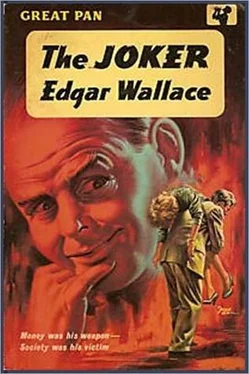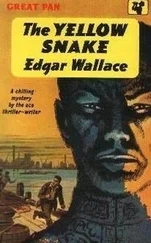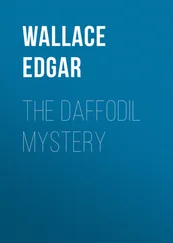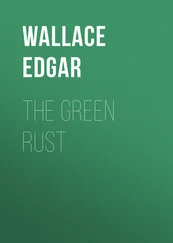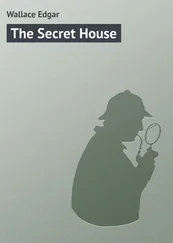‘Of what?’ she asked.
‘Harlow the Joker,’ he said. ‘Don’t you see that? Here’s a man who tried to murder you—a madman. Why? Because he thought you knew he was bolting. Here’s Harlow the magnificent masquerading like a fiction detective with a comic moustache! Why? Imagine the police asking all these questions. And Ellenbury of course would tell them quite a lot of things—some silly, some sane. The police are rather clever—not very, but rather. They’d smell—all sorts of jokes. I want a day if I can get it. Would you come to Park Lane for a day?’
‘Willingly!’ she said; and he went red.
‘That is a million-pound compliment,’ he said. ‘You’ll have to sit on the floor with a rug over you; you mustn’t be seen. As it is, if you are missed, your impetuous lover—did you speak?’
‘I didn’t,’ she said emphatically.
‘If he learns that you have disappeared, my twenty-four hours will be shortened.’
She glanced at Ellenbury. ‘What shall you do with…him?’ she asked.
‘He sits by my side; I dare not leave him here.’ He lifted up one of the suitcases and weighed it in his hand. ‘Would you like half a million?’ he asked pleasantly.
Aileen shook her head. ‘I don’t think there is much happiness in that money,’ she said.
He laughed. ‘Forgive me! I’ve got a little joke at the back of my mind—maybe I’ll tell you all about it!’
CHAPTER 24
SHE TOLD Jim all about this as he drove her back to her rooms after she had brought a policeman to release him.
‘He IS rather a darling,’ she repeated, and when he frowned she pressed his arm and laughed. ‘Somehow I don’t think you will arrest him,’ she said. ‘But if you do, hold him very tight!’
And she thought of Mr Harlow’s joke.
When, an hour later, a strong force of plain-clothes policemen descended upon 704 Park Lane, they found only Mrs Edwins, erect and intractable as ever, her hands folded over her waist.
‘Mr Harlow left for the country this morning,’ she said, and when they searched the house they discovered neither the Splendid Harlow nor the golden-bearded man called Marling.
‘Arrest me!’ she sneered. ‘It takes a clever policeman to arrest an old woman. But you’ll not take Lemuel.’
‘Lemuel?’
She realised her mistake.
‘I called him Lemuel when he was a child, and I call him Lemuel now,’ she said defiantly. ‘He’ll ruin every one of you—mark my words!’
She was still muttering threats when two detectives found her coat and hat and led her, protesting, to the police station.
Mr Harlow’s landed possessions were not limited to his pied-a-terre in Park Lane. He had a large estate in Hampshire, which he seldom visited, though he retained a considerable staff for its upkeep. It was known that he owned a luxurious flat in Brighton; and it was generally believed that somewhere in London he kept another extensive suite of apartments.
Stratford Harlow was a far-thinker. He saw not only tomorrow but the day after. For over twenty years he had lived in the knowledge that he was a reprehensible jester, and that there was always a possibility, if not a probability, that his supreme ‘joke’ would be detected.
He was at the mercy of many men, for only the mean thief may work single-handed. He had perforce to employ people who must be taken—a little—into his confidence.
But only one person knew the big truth.
His chauffeur, who knew so much, never dreamt the whole; to Ellenbury he had been a crooked market-rigger; to Ingle he had been an admirable enemy of society. To himself, what was he? That ‘joke’ idea persisted; almost the description fitted his every action. When he had locked the grille on Jim he knew that the ‘joke’ was on him. The machinery of the law had begun to move, and there was nothing to be gained by dodging from one hiding place to another. It was a case of night or nothing.
He went to the foot of the stairs and whistled; and soon Mrs Edwins came into view with the tall, bearded man.
‘Marling, I am going to take you for a little drive,’ said Stratford Harlow pleasantly. ‘You are at once a problem and a straw. You have almost broken my neck and I am grasping at you.’ He laughed gently. ‘That’s a mixed illustration, isn’t it?’
‘Where are you going?’ asked Mrs Edwins.
He fixed her with his cold eyes.
‘You are very inquisitive and very stupid,’ he said. ‘What is worse, you lack self-control, and that has nearly been my undoing. Not that I blame you.’ A gesture of his white hand absolved her from responsibility. ‘Telephone to Reiss to bring the car. Possibly he will telephone in reply that he is unable to bring the car. You may even hear the strange and authoritative voice of a policeman.’
Her jaw dropped.
‘You don’t mean?’ she asked quickly.
‘Please telephone.’
He was very patient and cheerful. He did not look at her; his eyes, lit with a glint of humour, focused upon the uncomfortable man who faced him.
‘I hope I’ve done nothing—’ began Marling.
‘Nothing at all—nothing!’ said Mr Harlow with the greatest heartiness. ‘I have told you before, and I tell you again, you have nothing to fear from me. You are a victim of circumstances, incapable of a wrong action. I would sooner die than that you suffered so much as a hurt! Injustice pains me. That variety of justice which is usually called “poetical” fills me with a deep and abiding peace of soul. Well?’ He snapped the question at the woman in the doorway.
‘What am I to do with that girl?’ she asked.
‘Leave her alone,’ said the big man testily, ‘and at the earliest opportunity restore her to her friends. Help Mr Marling on with his coat; it is a cold night. And a scarf for his throat…Good!’
He peered through the ground-glass window.
‘Reiss has brought the car. Trustworthy fellow,’ he said, and beckoned Marling to him. Together they left the house and were driven rapidly away. For nearly a quarter of an hour Mrs Edwins stood in the deserted vestibule, very upright, very forbidding, her gnarled hands folded, staring at the door through which they had passed.
The car drove through Mayfair, turned into a side street and stopped. It was a corner block, the lower floor occupied by a bank. There was a side door, which Mr Harlow opened and stood courteously aside to allow his companion to pass.
They went up a long flight of stairs to another door, which Harlow unlocked.
‘Here we are, my dear fellow,’ he said, closing the door gently. ‘This is what is called a labour-saving flat; one of the modern creations designed by expensive architects for the service of wealthy tenants who are so confoundedly mean that they weigh out their servants’ food! Here we shall live in comparative quiet for a week or two.’
‘What has happened?’ asked Marling.
The big man shrugged his shoulders.
‘I do not know—I rather imagine that I recognise the inevitable, but I am not quite sure. Your room is here, at the back of the house. Do you mind?’
Marling saw that it was a more luxurious apartment than that which he had left. Books there were in plenty. The only drawback was that the windows were covered with a thin coating of white paint which made them opaque.
‘I prepared this place for you two, nay, three years ago,’ said Harlow. ‘For a week or two, until we can make arrangements, I am afraid we shall have to do our own housework.’
He patted the other on the shoulder.
‘You’re a good fellow,’ he said. ‘There are times when I would like to change places with you. Vivit post funera virtus! I, alas! have no virtues, but a consuming desire to make wheels turn.’
Читать дальше
